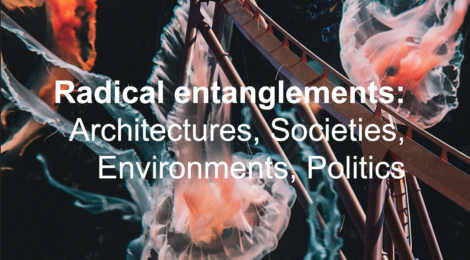
RAPS: Radical entanglements Eindhoven 2022-Nov-11-12
Radical Architecture Practice for Sustainability (RAPS) Eindhoven Conference 2022:
Radical entanglements: Architectures, Societies, Environments, Politics
See conference website at https://www.rapsresearch.com/eindhoven2022
Deadline for submissions of 300 words abstracts is August 31st, 2022
To be entangled is not simply to be intertwined with another, as in the joining of separate entities, but to lack an independent, self-contained existence.’
Barad (2007)*
‘Radical Entanglements’ acknowledges architecture and architectural practice as fundamentally entangled with the world, affective and affected. We are entangled, with each other, with our environments, architectures, other species, infrastructures, technologies, politics and more, in ways that are increasingly threatening our own conditions of existence. Despite this significance, these entanglements are not understood or explored in-depth as yet. The necessity for systemic change appears to be obvious, but how to enact transformations that are sufficiently radical is still unclear.
This conference explores diverse forms of practices, processes and modes across and within architecture through its heterogenous entanglements. At its core sustainability is about entanglements: of different actors, different entities, different scales, different timeframes, as well as the long-term affects of actions that result from them. We aim to draw out how these entanglements frame specific problems, exchange impacts and create potential solutions. The conference seeks to overcome reductionist explanation models, and a mode of thinking that rests on separately layered realities (e.g. the technical, the social, the material). Instead, it welcomes and encompasses the idea of heterogeneous characters and relational associations co-shaping each other. Whilst many approaches from systems theories to assemblage approaches have tried to explain and characterise these interdependencies, there have been few multimodal and multidisciplinary approaches towards sustainability developed through and for architecture.How can we discover, devise and create (additional) entanglements for and through architecture that are going to the roots or fundaments of our contemporary situation, thus enabling radical new forms of practices for sustainability? With radical entanglements the conference aims to develop new forms of knowledge and actions, through different sets of relationships, including though not limited to acts, processes, moments or practices of caring, imagining, acting or navigating. What entanglements are useful to move beyond the status quo, that challenge dominant paradigms, that offer new perspectives into practices for sustainability?
We are calling for a broad range of thinking and/or doing, drawn from experimental, multi- and interdisciplinary approaches as well as architecture, engineering, arts, design, sociology, anthropology, computation, psychology or environmental science. We seek to explore practices, processes and modes of operation through entangled relationships geared towards re-thinking architectural design and research practice for sustainability with the aim to advocate innovative approaches and transformational change.
*Karen Barad (2007), Meeting the Universe Halfway, Durham/London: Duke University Press, p.ix
Themes
The RAPS 2022 Eindhoven conference calls for contributions that explore radical entanglements through the following themes. Each theme signals an emphasis to the dynamic and architecture of the entanglement
Theme 1 | Caring: Ethics and Responsibilities
Architectural processes and practices to a large extent impact on the planet, on our and others vital conditions of existence, and on human and non-human well-being. Thus, our ways of creating, living, using, transforming, controlling and territorialising architectural spaces (physical and digital) are inevitably entangled with questions of caring, ethics and responsibility. There are many challenges, for instance: homelessness, affordability of housing, privatisation of public space, forced labour, bereft designed environments, architecture for profit, excessive resource consumption, waste. What are the moral principles that govern our acting, behaviours, wants, needs, uses of space, matters, privacy, ownership, inclusivity, diversity? What does it mean for architects and stakeholders involved in architectural practices to care, to act ethically and responsibly, to look after others and/or the environment? How can architecture balance care towards the individual with that of the collective or negotiate concern for the present with that for the future? What part can architecture play in the ethics of how we want to live together?
Theme 2 | Imagining: Desirable futures and Dreams
Designers, through their heightened capacity to imagine, have the potential to ask questions, inspire new thinking, create scenarios and envision potential futures. The power of imagination and dreaming can be a crucial driver to overcome the status quo and think outside the box. Speculative scenarios can open up new opportunities, make ideas tangible, discussable and help bring them from the future into the present. Imagination is a concept far more frequently invoked than it is analysed. How do we study imaginaries? How can we create novel entanglements to inspire new thinking and develop radical visions and scenarios of sustainable futures? What narratives and imaginaries lead to other possible futures? How can we create unusual inspirations and make proactive steps towards desirable futures? How can we visualise our dreams? How do we want to live in the future?
Theme 3 | Acting: Practice and Impact
We are in a pivotal decade, characterized by multiple challenges and modes of existence. We must act now, both collectively and individually. But without a profound change of our wider socio-technical systems, we will not tackle these challenges ahead. Exploring actions, practices, alternative modes and socio-ecological relationships, on different scales, locally or globally; grassroots projects, politiques and policies ranging from micro-level practices in co-housing, alternative energy provision, shared resources, co-production of urban space, urban agriculture, peer-to-peer consumption and production, and alternative economies. How to rethink the role of the architect in sustainable futures and her relation to an issue action-based approach to practice? How can architects and architecture become agents of change? What radical entanglements can be created through architectural processes and practices? What practices and projects have enacted radical impact and change?
Theme 4 | Navigating: Concepts and Strategies
The world is complex and entangled. There are multiple relations, but for individuals or collectives not all relations are equally important. Without assumptions and choices we cannot move forward and develop approaches. How do we choose, and develop pathways? How are these pathways designed and composed? There are multiple worldviews and entanglements of multiple entities, how do they differ? What are the suppressed, surprising or crucial entanglements towards sustainability that are built on specific forms or knowledge, framing, moments, roles, human/non-human, ontologies, realities, and actions? How to deal with messy and complex relations? How do we explore them? What is our map or compass? How to navigate through them? What are the conceptual approaches, strategies or hands-on practical approaches that may enact radical impact and change?
CONFERENCE DETAILS
RAPS Eindhoven Conference ‘ Radical Entanglements: Architectures, Societies, Environments, Politics invites a range of submission formats including papers, projects, performances, exhibitions, films, locations, roundtables, and more that will encourage and captivate discussion and debate on themes above. The conference in planned as a physical conference Friday and Saturday, November 11-12th, at Eindhoven University of Technology (TU/e), the Netherlands (see also www.tue.nl).
Keynotes
We are excited to be joined by radical entanglement visionaries including Kiel Moe (Architect and Builder), and Doina Petrescu and Constantin Petcou (Professor of Architecture & Design Activism, University of Sheffield / Co-Founders of Atelier d’Architecture Autogeree) in the keynote and debate panel sessions in November 2022. The keynote sessions will be conceptualizing the relationships between practices, society, materiality and agency, and help us reflecting on how assemblages and entanglements could strengthen to understand architecture’s dependences, as well as, how to advocate radical design approaches and transformational change.
SUBMISSION DETAILS
Please submit
(1) title (2) abstract of 300 words (3) 1 to 5 images (4) a 50 words bio, and (5) your chosen theme.
Submit to raps@tue.nl by August 31st, 2022.
SCHEDULE
| MAY 12 | call for abstracts |
| JULY 15 | submission of abstracts |
| AUGUST 15 | notification of selected paper abstracts + conference registration opens (early bird registration) |
| OCTOBER 1 | deadline to confirm acceptance to present paper by registering for the conference (conference registration regular) |
| NOVEMBER 11-12 | conference in Eindhoven |



